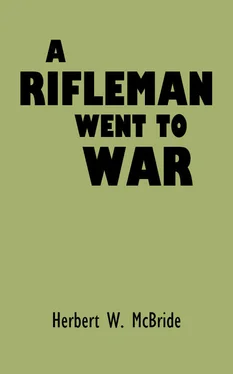A RIFLEMAN WENT TO WAR
By
Herbert W. McBride
Captain
Twenty-first Battalion
Canadian Expeditionary Force
and
United States Army
Being a narrative of the author's experiences and observations while with the Canadian Corps in France and Belgium, September 1915–April 1917. With particular emphasis upon the use of the military rifle in sniping, its place in modern armament, and the work of the individual soldier.
Originally published by Small-Arms Technical Publishing Company, 1935
This edition copyright © 2012 Tales End Press
ISBN 978-1-62358-029-2
This ebook uses the spelling from the original printed edition, except where typographical errors have been corrected. The cover design also reflects that of the original.
We love to get feedback and suggestions — just email feedback@talesendpress.com, or leave a comment on our book blog at www.talesendpress.com.

Ottawa, Canada,
November 9, 1935.
The author of this book — the late Herbert W. McBride — served in my Battalion as private, non-commissioned officer and officer. He was one of the best fighting men I knew and was promoted and decorated on my recommendations.
He was considered one of the best “Machine Gunners” in the Allied Army. Also one of the best shots with a rifle.
Herbert W. McBride was outstanding as a fighting man, fearless, untiring, a genius for invention, and always seeking authority to be given the opportunity of damaging the enemy. I had the greatest admiration for Captain McBride as a soldier, and with an army of such men it would be an easy matter to win against any troops. It was such fighting ability that enabled my 21st Battalion to come home with the record of never having been given a black eye in over four years of active participation in the war. They never went after anything they did not take, and they never gave up anything they captured. Of the original 1058, less than 150 are now alive, most of them buried in Flanders’ Fields and in the Somme.
W. S. Hughes,
Brigd. General.
This book is dedicated to all those members of the original Twenty-first Battalion, Canadian Expeditionary Force, who served in the Machine Gun Section during the time I had the honor to belong to that unit.
The following list, made from memory and such meager records as I possess, may, possibly, omit some of them. If so, I tender my most sincere apologies. I would not, intentionally, slight any member of that gallant Section.
*Allen
Baldson
Booker
*Bouchard
*Brooks
*Castleman
*Charles
*Clark
+Currie
*Deegan
*DeLisle
*Dupuis
Endersby
Esdon
Flannigan
*Freeman
Gillette
*Gordon
*Gray
Hart
Harvey
Jackson
*Jendon
+Johnstone
Laidlaw
*Lanning
Lee, Cecil
Lee, Jack
Lynch
+McBride
McFarlin
McGinness
McNab
Mangan
Meeks
+*Norton-Taylor
Parker
Paudash
*Peverelle
Red path
Rothwell
*Russell
Shangrow
Shepard
Smith
Southgate
*Stillman
*Tinkess
*Toms
*Wendt
+Williams
*Wilson
Those marked with an asterisk were killed in action.
All the others were wounded.
Those marked with a “+” were commissioned.
Herbert W. McBride.
An Explanation and an Introduction
It fell to the lot of the author of this narrative to serve as a member of the British Army in some of the battles it fought during the not-so-recent Great War. Ever since my return to the United States I have been asked countless questions by hundreds, yes thousand, of friends and acquaintances relative to my personal experiences in that conflict. The great majority of these questioners happened to be riflemen or soldiers of our own U.S. Army who did not have the “luck” (as they expressed it) to serve in battle, or to have ever used their military rifles for the purpose for which they were designed. Yet — like myself at the beginning of that great conflict — they felt fully qualified and were eager to face the common enemy and do their bit. Moreover, like any qualified workman, they had the true craftsman’s intense interest in any and all questions of work, tools or technique relating to even the most minute phase of their chosen profession — riflecraft.
It is for the edification of individuals such as these that I have been persuaded to write these pages. In doing so, I have purposely avoided the fields of strategy, applied tactics, military movements and, yes, even history; because, strange to say, nobody asked me anything about these general subjects of war; not, I take it, because they have been treated in so many other accounts, but because they are academic, theoretical — meaningless until they have been made to “tick”, have been taken off paper and shown on the battlefield; and here it is soon discovered that what makes them go is MEN. And this is just what my inquirers have been asking about. Their questions have been of seemingly insignificant things, which, when they are all answered, give one some sort of a picture of MEN at WAR.
Hence — and as the proper preparations for the defense of my Country are yet a vital matter with myself — I have tried to the best of my humble ability to give, in the chapters which follow, the honest answer to many of these questions regarding such small and human matters — the most important of all matters however, because they relate directly and particularly to the individual man, with whom battles are always won.
In describing these incidents and experiences and in making the observations given, I have carefully tried to stick to the straight and narrow path of truth, and tell the story as things really happened — with fictitious “sob stuff” and dramatics left out. Hence, if you do not find enough material about rifle shooting, or about scouting, or some other phase of warfare upon which you particularly wanted information, please be lenient with the old man and remember that I did not make the war. I did only my own little bit in it and must tell of the things which actually did happen and just how they happened. This I have done and this only.
* * *
I have often said that a soldier can and does outlie a fisherman and I still say it, but now I have come to the conclusion that he is not entirely to blame in the matter. The truth is that the public — his public — demands it. The average citizen: man, woman or child, has such peculiar notions as to actual modem battle conditions that it is impossible to make them understand anything beyond the fact that it is a fight; and fighting, as they visualize it, means a stand up and knock down, hand-to-hand struggle. They think that, because a man was in the Army, in France, and took part in some of the great battles — the Argonne, for instance — that he must have shot, bayonetted or otherwise killed off innumerable Germans and are inclined to doubt the veracity of any honest-minded soul who tries to tell them a true and straightforward story of events as they really happened. They just cannot understand that, out of the million or so of soldiers who actually did their bit in that great offensive, probably not ten per cent ever saw a German until he came back through the lines, a prisoner. The soldier, or ex-soldier soon learns this and to relieve himself of the necessity of long and tedious explanations, he simply starts in to invent a lot of bloodcurdling, spectacular tales; whereupon everybody is satisfied. Man believes what he wants to believe and that is the kind of stuff they want to hear. It coincides with their already formed ideas of what a battle ought to be like.
Читать дальше












